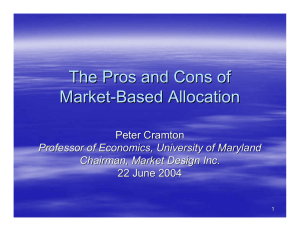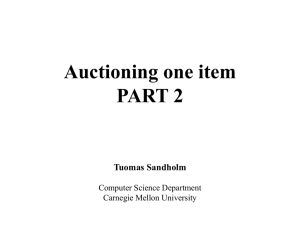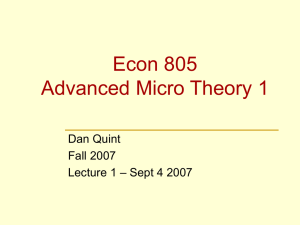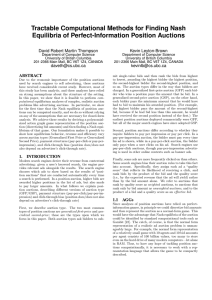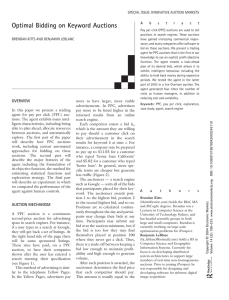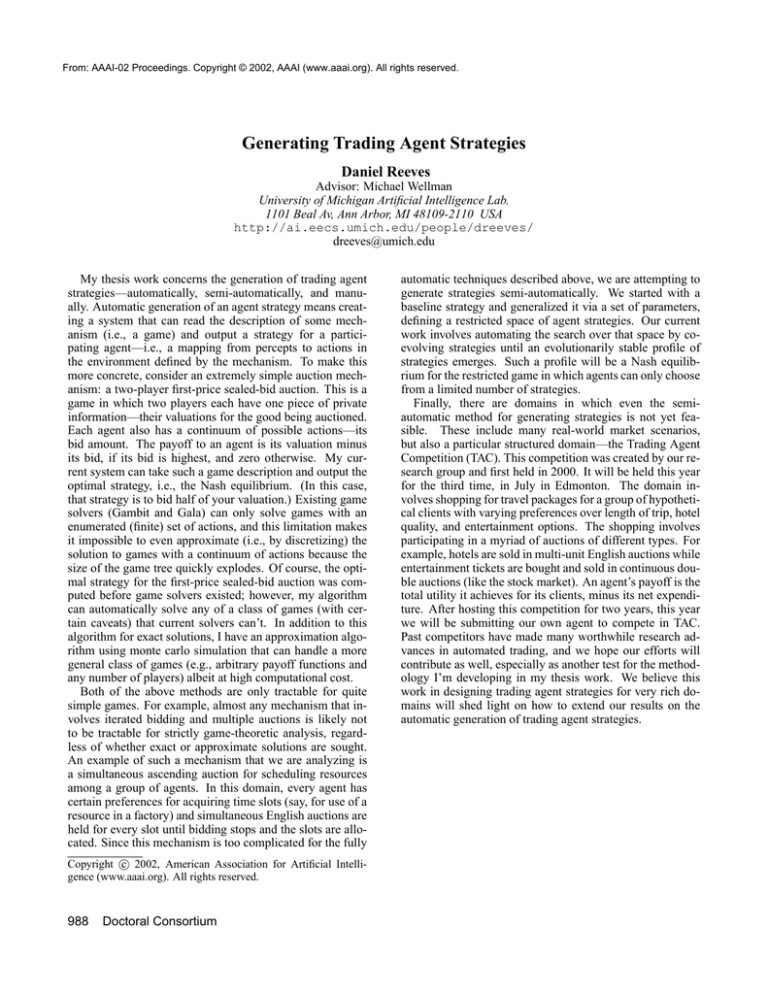
From: AAAI-02 Proceedings. Copyright © 2002, AAAI (www.aaai.org). All rights reserved.
Generating Trading Agent Strategies
Daniel Reeves
Advisor: Michael Wellman
University of Michigan Artificial Intelligence Lab.
1101 Beal Av, Ann Arbor, MI 48109-2110 USA
http://ai.eecs.umich.edu/people/dreeves/
dreeves@umich.edu
My thesis work concerns the generation of trading agent
strategies—automatically, semi-automatically, and manually. Automatic generation of an agent strategy means creating a system that can read the description of some mechanism (i.e., a game) and output a strategy for a participating agent—i.e., a mapping from percepts to actions in
the environment defined by the mechanism. To make this
more concrete, consider an extremely simple auction mechanism: a two-player first-price sealed-bid auction. This is a
game in which two players each have one piece of private
information—their valuations for the good being auctioned.
Each agent also has a continuum of possible actions—its
bid amount. The payoff to an agent is its valuation minus
its bid, if its bid is highest, and zero otherwise. My current system can take such a game description and output the
optimal strategy, i.e., the Nash equilibrium. (In this case,
that strategy is to bid half of your valuation.) Existing game
solvers (Gambit and Gala) can only solve games with an
enumerated (finite) set of actions, and this limitation makes
it impossible to even approximate (i.e., by discretizing) the
solution to games with a continuum of actions because the
size of the game tree quickly explodes. Of course, the optimal strategy for the first-price sealed-bid auction was computed before game solvers existed; however, my algorithm
can automatically solve any of a class of games (with certain caveats) that current solvers can’t. In addition to this
algorithm for exact solutions, I have an approximation algorithm using monte carlo simulation that can handle a more
general class of games (e.g., arbitrary payoff functions and
any number of players) albeit at high computational cost.
Both of the above methods are only tractable for quite
simple games. For example, almost any mechanism that involves iterated bidding and multiple auctions is likely not
to be tractable for strictly game-theoretic analysis, regardless of whether exact or approximate solutions are sought.
An example of such a mechanism that we are analyzing is
a simultaneous ascending auction for scheduling resources
among a group of agents. In this domain, every agent has
certain preferences for acquiring time slots (say, for use of a
resource in a factory) and simultaneous English auctions are
held for every slot until bidding stops and the slots are allocated. Since this mechanism is too complicated for the fully
c 2002, American Association for Artificial IntelliCopyright °
gence (www.aaai.org). All rights reserved.
988
Doctoral Consortium
automatic techniques described above, we are attempting to
generate strategies semi-automatically. We started with a
baseline strategy and generalized it via a set of parameters,
defining a restricted space of agent strategies. Our current
work involves automating the search over that space by coevolving strategies until an evolutionarily stable profile of
strategies emerges. Such a profile will be a Nash equilibrium for the restricted game in which agents can only choose
from a limited number of strategies.
Finally, there are domains in which even the semiautomatic method for generating strategies is not yet feasible. These include many real-world market scenarios,
but also a particular structured domain—the Trading Agent
Competition (TAC). This competition was created by our research group and first held in 2000. It will be held this year
for the third time, in July in Edmonton. The domain involves shopping for travel packages for a group of hypothetical clients with varying preferences over length of trip, hotel
quality, and entertainment options. The shopping involves
participating in a myriad of auctions of different types. For
example, hotels are sold in multi-unit English auctions while
entertainment tickets are bought and sold in continuous double auctions (like the stock market). An agent’s payoff is the
total utility it achieves for its clients, minus its net expenditure. After hosting this competition for two years, this year
we will be submitting our own agent to compete in TAC.
Past competitors have made many worthwhile research advances in automated trading, and we hope our efforts will
contribute as well, especially as another test for the methodology I’m developing in my thesis work. We believe this
work in designing trading agent strategies for very rich domains will shed light on how to extend our results on the
automatic generation of trading agent strategies.

